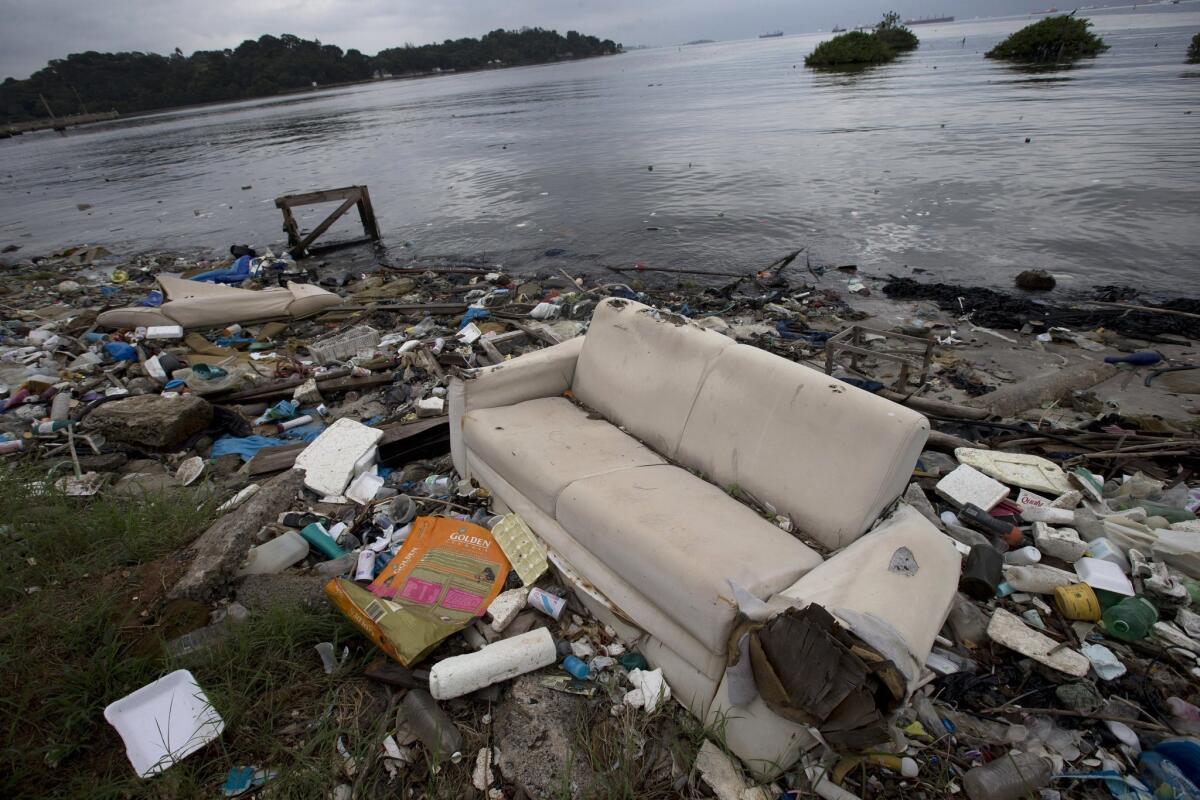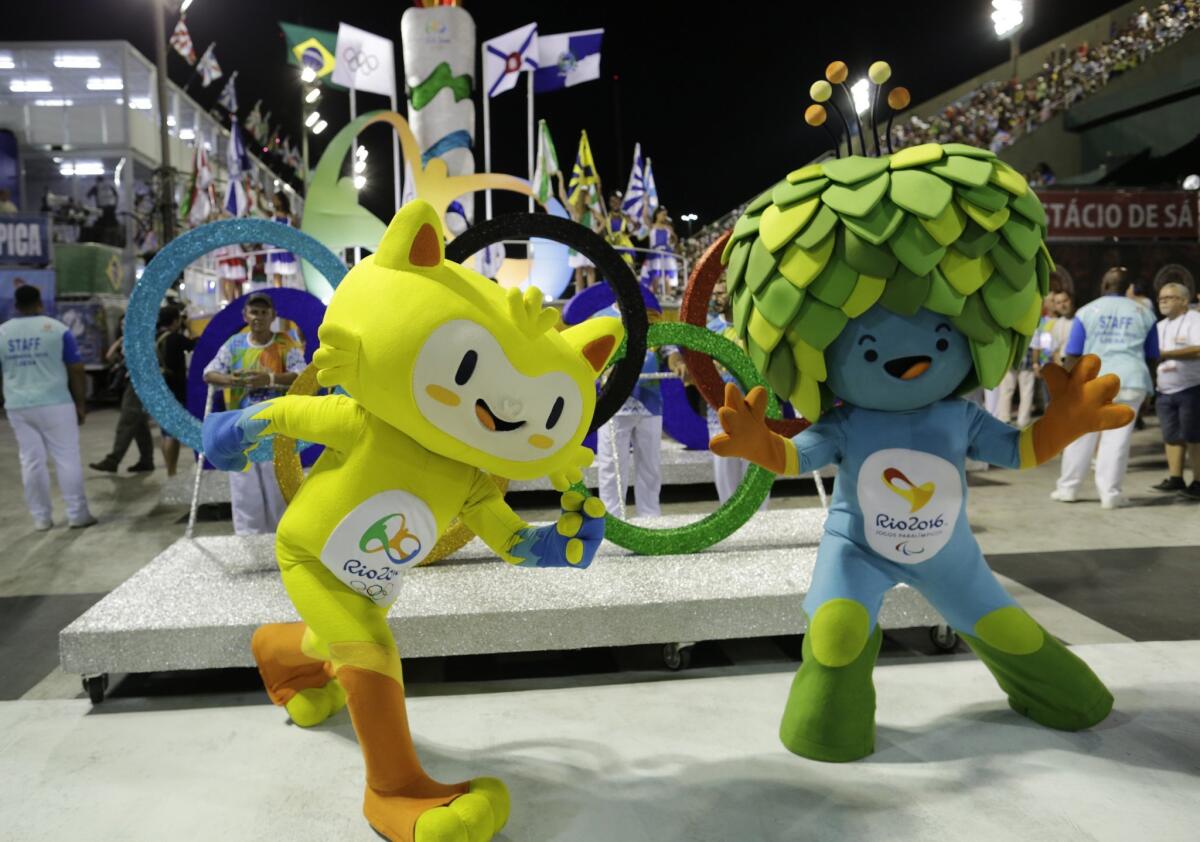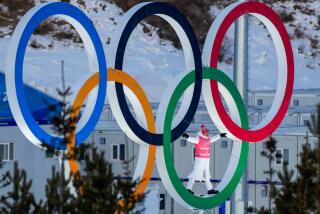The Zika virus is just the latest challenge facing the Rio Olympics
- Share via
Reporting from Rio de Janeiro — The threat that fear of Zika could lead tourists, or even athletes, to stay away from the 2016 Olympics has been added to a list of problems for organizers to resolve before the Rio games in August.
Brazil is a far cry from the booming, stable country it was in 2009 when it beat out Chicago’s bid to host the Olympic Games. The economy has slipped into a recession, and President Dilma Rousseff is facing impeachment proceedings. It’s unclear who will be governing the country in six months.
See the most-read stories this hour >>
Rio’s government has also failed to deliver on environmental promises, specifically to clean up pollution at the Guanabara Bay and Lagoa Rodrigo de Freitas, where sailing and rowing events will be held, said Jules Boykoff, author of “Power Games: A Political History of the Olympics” and professor of political science at Pacific University in Oregon.
“It’s not uncommon for Olympics to suffer from the need for last-minute preparations, and in this sense Rio is on par with previous Olympic Games,” Boykoff said. But its broader problems are unusual for an Olympic city — especially the outbreak of the Zika virus.
Zika, which is primarily spread by mosquitoes, causes a debilitating but nonfatal disease that, by itself, would probably not deter most tourists and athletes. But it has been associated with a surge in cases of microcephaly, or “small head,” among newborns in Brazil, especially in the poorer northeast region. The virus has spread through the hemisphere and led the World Health Organization to declare a global medical emergency.
“Rio will welcome the world and its athletes to a very safe environment,” Mario Andrada, communications director for Brazil’s Olympic Committee, said Tuesday. He noted that August comes during the Brazilian winter, when mosquitoes are typically scarce.
“The rate of infections due to mosquito bites drops drastically and virtually reaches zero,” he said.

In this June 1, 2015, file photo, a discarded sofa litters the shore of Guanabara Bay in Rio de Janeiro, Brazil.
However, scientists recently detected the virus in saliva and urine, raising the question of how easily it may be transmitted by means other than mosquitoes. Researchers said they’re studying the issue now.
“Zika is a huge perception problem,” said Boykoff, adding that “it’s not clear how it will affect the decision of people in the U.S. when they decide whether or not they’ll go.”
The Brazilian and U.S. Olympic committees spent the beginning of this week responding to a leaked portion of a conference call, reported by the Reuters news agency, that appeared to show that U.S. Olympic Committee organizers told U.S. athletes that they could stay away if they thought the mosquito-borne virus was a safety threat.
The USOC insisted the report was wrong, although its denial did not specifically address the claim that it told athletes they could choose to stay away.
Join the conversation on Facebook >>
“Team USA looks forward to the Games and we did not, would not, and will not prevent athletes from competing for their country,” said USOC spokesman Patrick Sandusky in a written statement. “The inaccurate report cited an internal discussion with U.S. sports leaders pertaining to employees and the potential risks that the CDC has identified.”
In the year before the 2014 Brazil World Cup, the country was racked by heated conversations, both in local media and on the streets, about preparations for the tournament. Brazilians worried endlessly about the image they would present to the world, and thousands of protesters contested the way that public resources had been spent on the tournament.

The Rio 2016 Olympic mascots parade during Carnival celebrations at the Sambadrome in Rio de Janeiro on Feb. 7, 2016.
In the investigations surrounding a multibillion dollar corruption scheme at state-owned oil company Petrobras — which is based in Rio — executives of the construction companies that built some of the stadiums have been jailed, along with high-level politicians.
In contrast, the upcoming Olympics have only been scantily discussed, as the media concentrate more on economic and political problems, or even the current Carnival celebrations, which end Wednesday. Carnival in Rio this year has again been marked by the presence of numerous foreign revelers.
“Here, the focus has really been taken off the Olympics. People just really aren’t really talking about it much,” said Wellington Maciel, a bartender who often deals with both locals and foreigners visiting the city. “I suppose everyone is paying attention to our other crises instead.”
Bevins is a special correspondent.
MORE ON ZIKA VIRUS
Zika virus could prompt Kenya to withdraw from Summer Olympics
Zika virus raises more questions than answers for pregnant women
Fighting mosquitoes with mosquitoes: Biological weapons target Zika virus
More to Read
Sign up for Essential California
The most important California stories and recommendations in your inbox every morning.
You may occasionally receive promotional content from the Los Angeles Times.










